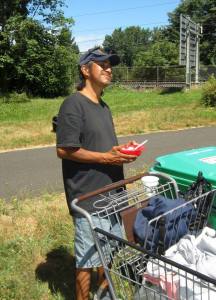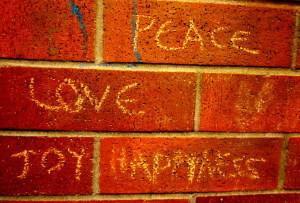-
Prayer and Scripture
 Teach me, O LORD, the way of Your statutes, And I shall observe it to the end.
Teach me, O LORD, the way of Your statutes, And I shall observe it to the end.
Give me understanding, that I may observe Your law And keep it with all my heart.
Make me walk in the path of Your commandments, For I delight in it.
Incline my heart to Your testimonies And not to dishonest gain.
Turn away my eyes from looking at vanity, And revive me in Your ways.
Psalm 119:33-37As a pastor and a teacher of God’s word, I want to do my homework. I study passages, read commentaries, analyze the original language, make a decided interpretation and apply it to our culture and context. It’s my job and I take it seriously, for it is my integrity before the Lord.
What is easy for me to forget is that God is the one who holds his word in his hand, that it is not mine to maneuver and manipulate in my skull to produce my intention. God’s word isn’t just His gift, but it is the mediator of my communication with Him, that is not a monologue, but the opportunity to discuss and learn from Him now, not just two thousand year old words.
In the passage above we learn:
The understanding of God’s word is in his hands;
The energy to obey God’s word is in his hands;
The intention to follow God’s word is in his hands;
The faithfulness of our actions in God’s word is in his hands.Thus, we need to use God’s word as an opportunity to experience God’s continuing grace, to not just intellectually explore new ideas but to allow His Spirit to invigorate new life in us.
Father, may we pursue your word with your desire, for the sake of your kingdom by your power for your glory. Amen.
-
Something for Us to Think About
 “Every city, however small, is, in fact, divided into two, one the city of the poor, the other of the rich; these are at war with one another.” -Plato
“Every city, however small, is, in fact, divided into two, one the city of the poor, the other of the rich; these are at war with one another.” -Plato“Our world is full of terrible contradictions: Plenty of food, but one billion go hungry. Lavish lifestyles for a few, but poverty for far too many others. Huge advances in medicine while mothers still die in childbirth, and children die every day from unclean water. Billions spent on weapons instead of keeping them safe.” -Ban Ki-moon
“In a country well governed, being poor is something to be ashamed of. In a country poorly governed, being wealthy is something to be ashamed of.” -Confucius
“I choose to identify with the underprivileged, I choose to identify with the poor, I choose to give my life for the hungry, I choose to give my life for those who have been left out of the sunlight of opportunity.” -Martin Luther King, Jr.
-
Transforming Homelessness
 The human brain is created to be infinitely flexible. If a person loses their sight or hearing, the section of the brain dedicated to that sense is then reused for other purposes. It takes some time, but any section of the brain can be transformed to a new skill. Our brain is in a new context and then it re-forms to develop new skills to get used to the new context. While we are developing those skills, we are uncomfortable and scared, but eventually we get used to where we are and we change who we are to adapt to the new context. This is the reason why humanity is the highest functioning animal. Not just because we can change our environment, but because we do a dance with our environment, both changing and learning to change until we and our environment are adapted to each other.
The human brain is created to be infinitely flexible. If a person loses their sight or hearing, the section of the brain dedicated to that sense is then reused for other purposes. It takes some time, but any section of the brain can be transformed to a new skill. Our brain is in a new context and then it re-forms to develop new skills to get used to the new context. While we are developing those skills, we are uncomfortable and scared, but eventually we get used to where we are and we change who we are to adapt to the new context. This is the reason why humanity is the highest functioning animal. Not just because we can change our environment, but because we do a dance with our environment, both changing and learning to change until we and our environment are adapted to each other.A great example of this is the deaf culture of the last hundred and fifty years. They were given an opportunity to build a deaf community that helps itself, born out of Gallaudet University in Washington DC. From that community comes a new, complete language—American Sign Language—telephones, lights to answer telephones and a culture that looks and sounds—yes, sounds—different than any culture that had ever existed. Many, if not most, modern deaf people would prefer to live as a deaf person, in the adaptive deaf culture than to get their hearing back and to try to live in “normal” culture. They have taken their “disability” and made it a cultural strength, thus increasing the diversity and power of the broader culture, and importing their culture around the world.
Not every person or aspect of culture has this ability to adapt and change. Most of us have certain abilities and so we are insisted upon to fit into the normative culture as it exists. Since most people have the ability to adapt to things as they are, they do. But not everyone has that opportunity. For instance, the homeless.
 The chronic homeless are a people who have all be de-normalized. They’ve been told, individually, that they do not belong in “normal” society and that they must live apart. They are denied a social network that can support them to fit into normal society. Those who have lived on the street for a year or more have not only been without a home, but they have been denied opportunities to come back into the fold of normative culture. And so they adapt to their new environment, and they form a new culture, based on their need to survive.
The chronic homeless are a people who have all be de-normalized. They’ve been told, individually, that they do not belong in “normal” society and that they must live apart. They are denied a social network that can support them to fit into normal society. Those who have lived on the street for a year or more have not only been without a home, but they have been denied opportunities to come back into the fold of normative culture. And so they adapt to their new environment, and they form a new culture, based on their need to survive.In their new context, they are taught that they are disgusting and shameful. They learn this by the fear and anger that some people approach them with. They learn this by their interactions with police officers, which has increased tremendously since they became homeless. They learn this because of the fear they experience when they sleep—fear of being seen, fear of being woken, fear of being beaten in the middle of the night by strangers. They learn that they are vulnerable people, partly because their sleeping gear and personal items are often stolen, but also because they now can receive things for free from generous people, both homeless and non-homeless. They learn their helplessness because people offer them food for free.
They also learn that they are criminals. They learn this through police interactions, who basically treat them as criminals, or at least suspects of wrong-doing. Because they are treated like criminals, they realize that they can act like criminals because they are already suffering the consequences of criminal activity. So, clumsily, they learn some criminal activity. But they don’t really put their heart into it, because they know, in their heart, they aren’t a criminal. They are just someone who is trying to survive. They will try using and abusing drugs and alcohol because it helps them to not care about the shame and blame that they are saddled with.
But these long-term homeless folks still have the amazing brains that are adaptive. They just are using them to survive in their new environment. They aren’t useless or helpless, no matter how often people put them in that box. But since they are expected to be both useless and helpless, they learn to adapt to that environment.
But what if that environment changed? What if they were given opportunities to help themselves? Then the homeless adapt toward that. On a church property in Gresham, a small group of homeless have a place to sleep and cook and they take care of their own environment, all on a volunteer basis. In Portland, a community builds its own homes and lives independently, with small help from their compassionate surrounding neighborhood. Perhaps homelessness isn’t easy to adapt back to be “normal”. But it can be adapted in order to be self-sustaining and in cooperation with the surrounding, normative communities.
The poorest communities in the world have escaped poverty. It happens every day, all over the world. It doesn’t happen because a large organization steps in and gives the people what they need. It is because they develop within themselves adaptive communities that help themselves.
 It usually goes like this: a representative of a development organization steps into an impoverished community, and organizes a meeting with the community leaders and other interested parties. The representative says that his organization wants to help them create a project to be a more sustainable community, but the community itself must decide what this project will be and they must determine how it would be done. Over time, through discussions, arguments and anger, a decision is made by the community as a whole on one project. The organization provides some seed money and some expertise to develop that project, and with money and labor by the community, the project is finished, and the community is improved. Then the community moves onto the next project.
It usually goes like this: a representative of a development organization steps into an impoverished community, and organizes a meeting with the community leaders and other interested parties. The representative says that his organization wants to help them create a project to be a more sustainable community, but the community itself must decide what this project will be and they must determine how it would be done. Over time, through discussions, arguments and anger, a decision is made by the community as a whole on one project. The organization provides some seed money and some expertise to develop that project, and with money and labor by the community, the project is finished, and the community is improved. Then the community moves onto the next project.The development organization doesn’t come with their own agenda apart from one: creating a community that creates their own solutions and implements them. They don’t have an idea of how the community should live, or what the solutions are, or how to create a better community. They just provide the impetus and opportunity to create a greater level of sustenance.
This can work for the homeless. It has been done through Right to Dream Too, and other sustainable communities. It cannot be done without struggle and without sacrifice, because our society has determined that the chronic homeless are blameworthy, helpless and useless. But the homeless themselves can change those false expectations, if they but given empowerment and encouragement. The homeless have already proven that they are adaptive and community-oriented. They just need to be given the opportunity to make their own changes, to be given the opportunity of location and some seed money, to make their own changes.
As long as society is telling the chronic homeless who they are and how they should survive, the homeless will never make steps forward, for society is big on creating demands, but not opportunities. The homeless need to be given the location, time and resources to make their own changes. We will not see homelessness end, but we will see it transformed into a creative, adaptive culture that is still separate from but fits within normative culture.
-
-
Two Stories about Mercy
 The other evening a woman gets off of the MAX at 162nd and walks the street to her work. A gang corners her and demands his money. She didn’t have any, so they beat her up and left her on the street, rifled through her purse, found out she wasn’t lying and left her there, bleeding.
The other evening a woman gets off of the MAX at 162nd and walks the street to her work. A gang corners her and demands his money. She didn’t have any, so they beat her up and left her on the street, rifled through her purse, found out she wasn’t lying and left her there, bleeding.A Baptist pastor whose church was down the street drove by, but he had a board meeting to go to, so he couldn’t stop. A staff person for an important local homeless ministry happened to be going by, saw the woman, wanted to stop, but he had an important donor to meet, so he kept going.
A Muslim man, dressed in a white cap was just walking by after prayer, saw the woman and immediately called 911, check her pulse, took off his cap and pressed it to the wound, speaking kind words to the woman until the ambulance arrived.
So which of the three displayed the mercy of God?
* * *
 The unworthy nations of this world will be subjected to the king of mercy and power. At that point, every person in the world will be taken before the king, and they will be divided from one another: one side to his right and another to his left.
The unworthy nations of this world will be subjected to the king of mercy and power. At that point, every person in the world will be taken before the king, and they will be divided from one another: one side to his right and another to his left.The king will look to his right and tell them, “I welcome you into my kingdom, for you are the kind of people I want to live with, that I want to fill the world with. For I was oppressed and downbeaten and starving and hopeless and avoided and you went out of your way to help me, to support me and to encourage me. Please, let me live with you forever.”
And those on his right will say, “When did we do this? Many of us aren’t Christians and others didn’t go to the right churches?” His reply: “This day is based not on who you say you are, but on what you did. You had compassion on my family, and so you had mercy on me. Please, come in and receive the world.”
The king will then turn to those on his left and say, “I cannot have you in my kingdom. You shall spend the rest of your days miserable because you will be living with people just like you. For I was homeless and oppressed and starving and suffering with my children and you laughed at me. You told your spouse that I wasn’t worthy of being helped. You were rude to me in my suffering. You ignored me when I was at my wits end. You politely told me that you couldn’t help me when the reality is you wouldn’t help me. You are the people I would never have in my world, because you tear the hurting down instead of building them up. I exile you.”
And they will reply, “But Lord, we worshiped you in our churches. We built you great buildings in your honor. We created communities in your name. We preached to thousands. We led Bible studies and prayer meetings. We got rid of those who were unholy from your people. We made the world safer through our military and police force. We loved, but in our own way. Isn’t that enough?”
He said, “Since you did not love the vulnerable, but harmed them, you are not the citizens I can have in my kingdom. See if you can live with each other. You are exiled.”
3733 N Williams Ave
Portland, OR 97227
503.888.4453
AnawimCC@gmail.com
Ministry Locations and Times »














